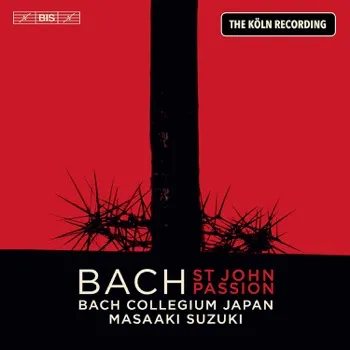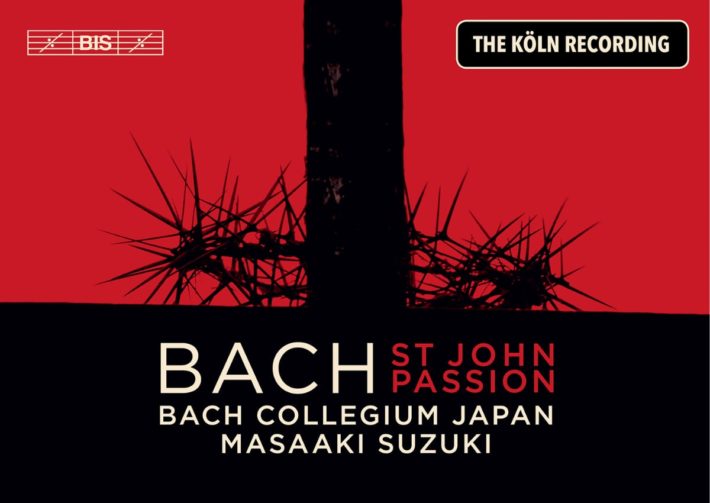Bach Collegium Japan’s newest recording includes a note detailing its complicated production. In March 2020, the group began a European tour; after the first few performances, they arrived in Köln, only to learn that the remainder of the tour was cancelled because of the pandemic. The Kölner Philharmonie invited them to live stream a performance of the St. John Passion, after which, having a few days left in Köln, they decided to make an audio recording. The following days, though chaotic and demanding, resulted in this new release.

These intense circumstances have influenced the new album in an important way – there is a level of visceral excitement here that I have never heard in a Bach Collegium Japan performance. The technical and musical quality of this ensemble has been a consistently enjoyable feature of their Bach recording over the last 30-some years. But Suzuki’s slightly understated, more contemplative viewpoint has also been a consistent factor, especially when compared to Gardiner and Fasolis recordings.
This is Bach Collegium Japan’s third recorded performance of the Johannes Passion: the first, released in 1999, seems intent on setting an atmosphere of dignified devotion that at times understates the text’s gut-wrenching violence. Their second release, on DVD, more successfully balances devotion and drama, but this newest release attains yet another level in which Suzuki and his musicians fully unearth the dramatic and contemplative elements, resulting in a profoundly moving performance.
This is readily apparent right in the opening movement. The 1999 version features beautiful and supple playing, everything immaculately in its place. Melodic contours are refined and smoothed out, instilling a solemn nobility, as if Suzuki and his forces are carefully preparing us for the terrible story to come. This new reading, almost a minute faster, immediately hurls us into the midst of the story. The insistent, driving bass line pushes us to become witnesses and participants in the action. Note too, how the winds stress their many dissonant voice crossings – it all makes for compelling emotional immersion.
James Gilchrist’s evangelist is every bit the equal of Gerd Türk’s in the first recording. Both are authoritative guides through the biblical narrative, offering textual clarity and awareness of the narrative’s dramatic and theological meaning. As in the previous versions, the harpsichord continuo, here played by the conductor’s son, Masato Suzuki, can be a bit over enthusiastic in recitatives. But while the earlier recording’s soloists focused on inward contemplation, this new group embraces a more overtly theatrical reading. This makes ebb and flow within the various scenes more dramatic. In 1999, the choir’s representation of the crowd was again somewhat objective but listen to their new rendition of the scene beginning with “Da führeten sie Jesum” (CD 2, tracks. 2-4). As the jousting between Pilate and Jesus (sang by Christian Immler) grows in intensity, so does the choir’s cries for Christ’s punishment and death. Immler, it’s worth mentioning, did a fine job as Jesus in Suzuki’s recent St. Matthaus Pasion” (reviewed here).
Zachary Wilder’s “Ach, mein Sinn” (CD1, track 13), and Immler’s “Betrachte, meine Seel” (CD2, track 5) are direct and heartfelt. The sadness Damien Guillon evokes in “Es ist vollbracht” (CD2, track 16) haunts the listener long after its final notes have sounded, as does Hana Blažíková’s “Zerfließe, mein Herze” (CD 2, track 21). And in each of these arias, note how the orchestral playing establishes and heightens the emotional affect. Having now recorded every one of Bach’s cantatas, oratorios and passions, Bach Collegium Japan perform with an intuitive naturalness that is gripping from first to last.
Another significant change in interpretation is heard in the chorales. In Suzuki’s earlier recording, the chorales are performed in a straight-forward, dispassionate manner. Suzuki now encourages a more “madrigalian” approach, using a larger tonal palette and dynamic ranger to paint each new sentiment. Some listeners may find this fussy and intrusive, but it is in keeping with his newer interpretive approach and certainly draws the listener into the story more deeply. Interestingly, Dr. Robin Leaver excellent program notes focus on the role of the chorale in Bach’s setting.
Despite the hurried nature of the production, engineering is top-notch, and even if the bass is more pronounced this time around, there is an ideal blend of analytical clarity and warmth, both on SACD and regular stereo. No single interpretation can capture every aspect of this monumental music. But Suzuki’s latest is his finest, and belongs in the library of anyone who loves this work – urgently recommended.
Bach – St. John Passion (“Johannes Passion”)
James Gilchrist – Tenor (Evangelist)
Christian Immler – Bass (Jesus)
Hana Blažíková – Soprano
Damien Guillon – Alto
Zachary Wilder – Tenor
Bach Collegium Japan
Masaaki Suzuki – Conductor
BIS Record, Hybrid SACD BIS-2551




















